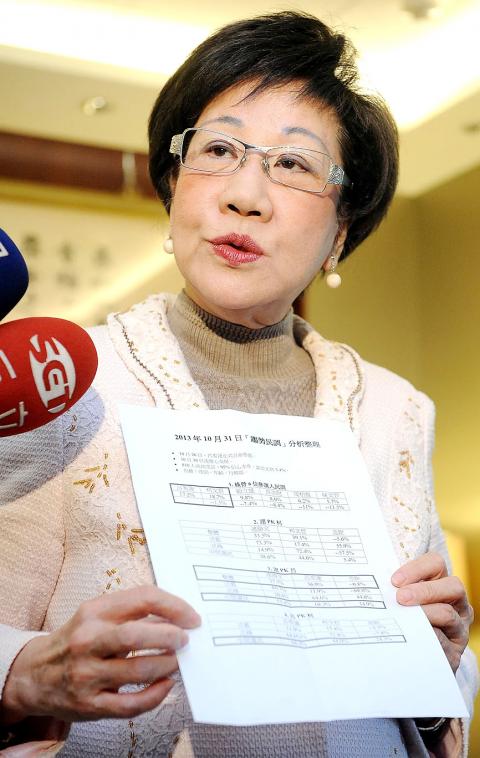Divisions within the Democratic Progressive Party (DPP) have come to the fore again, as the party prepares for the seven-in-one elections next year, with former vice president Annette Lu (呂秀蓮) warning that it could turn away public support.
Lu, who is hoping to represent the DPP in the race for Taipei mayor next year, said the Taipei primary has become a “proxy war” between party heavyweights and could result in a public backlash.
Lu did not name names, but DPP Chairman Su Tseng-chang (蘇貞昌) is widely believed to favor lawyer Wellington Koo (顧立雄), while former DPP chairperson Tsai Ing-wen (蔡英文) reportedly supports National Taiwan University Hospital physician Ko Wen-je (柯文哲), an independent who currently has the highest support rate among all pan-green aspirants.

Photo: Chu Pei-hsiung, Taipei Times
The Taipei primary has become a proxy for a private competition between Su and Tsai for the DPP chairmanship election next year, Lu said.
This maneuvering for personal gain could cost the party dearly, such as the DPP losing in all constituencies in northern and central Taiwan except Yilan County next year, she said.
Lu, who has repeatedly complained of a lack of media coverage of her campaign and the media’s focus on her age, urged DPP headquarters to remain neutral in the primaries.
Meanwhile, the emergence of the New Tide, arguably the most powerful DPP faction, has caught the public’s attention and raised tensions in the party after the group secured a series of primary victories.
Three nominees — Pan Men-an (潘孟安) of Pingtung County, Wei Ming-ku (魏明谷) of Changhua County and Lee Wen-chung (李文忠) of Nantou County — are New Tide members, while Lee Ching-yung (李進勇) won the Yunlin County primary with the backing of the New Tide.
In Greater Taichung, Tsai Chi-chang (蔡其昌), another New Tide member, is trying to narrow the gap with Lin Chia-lung (林佳龍) before the primary on Dec. 20. In Taipei, the group appears to have thrown its support behind Koo, with many city councilors who are members of the group endorsing the lawyer.
A DPP resolution in 2006 dissolved all party factions, prohibiting them from establishing offices, recruiting members and fundraising. However, the factions did not really disappear, as many continue to operate in the form of think tanks or foundations led by a senior party member.
The New Tide’s string of primary wins and heavy campaigning to assist them by Greater Tainan Mayor William Lai (賴清德) and Greater Kaohsiung Mayor Chen Chu (陳菊), both New Tide members, could escalate tensions within the party, former DPP legislator Julian Kuo (郭正亮) said yesterday.
Incumbent mayors and commissioners are advised to stay neutral in the primaries to prevent factional tensions, Kuo said.
Former premier Yu Shyi-kun’s victory in the New Taipei City primary, which drew protests of unfairness from New Taipei City (新北市) Chapter director Lo Chih-cheng (羅致政), who is close to Tsai Ing-wen, has also been described as a trade-off between Yu and Su in exchange for support of Su’s re-election campaign for the chairperson’s post next year. Yu and Su have denied the rumor.

ANOTHER EMERGES: The CWA yesterday said this year’s fourth storm of the typhoon season had formed in the South China Sea, but was not expected to affect Taiwan Tropical Storm Gaemi has intensified slightly as it heads toward Taiwan, where it is expected to affect the country in the coming days, the Central Weather Administration (CWA) said yesterday. As of 8am yesterday, the 120km-radius storm was 800km southeast of Oluanpi (鵝鑾鼻), Taiwan’s southernmost tip, moving at 9kph northwest, the agency said. A sea warning for Gaemi could be issued tonight at the earliest, it said, adding that the storm is projected to be closest to Taiwan on Wednesday or Thursday. Gaemi’s potential effect on Taiwan remains unclear, as that would depend on its direction, radius and intensity, forecasters said. Former Weather Forecast

As COVID-19 cases in Japan have been increasing for 10 consecutive weeks, people should get vaccinated before visiting the nation, the Centers for Disease Control (CDC) said. The centers reported 773 hospitalizations and 124 deaths related to COVID-19 in Taiwan last week. CDC Epidemic Intelligence Center Director Guo Hung-wei (郭宏偉) on Tuesday said the number of weekly COVID-19 cases reported in Japan has been increasing since mid-May and surpassed 55,000 cases from July 8 to July 14. The average number of COVID-19 patients at Japan’s healthcare facilities that week was also 1.39 times that of the week before and KP.3 is the dominant

The Chinese Communist Party’s (CCP) working group for Taiwan-related policies is likely to be upgraded to a committee-level body, a report commissioned by the Mainland Affairs Council (MAC) said. As Chinese President Xi Jinping (習近平) is increasingly likely to upgrade the CCP’s Central Leading Group for Taiwan Affairs, Taiwanese authorities should prepare by researching Xi and the CCP, the report said. At the third plenary session of the 20th Central Committee of the CCP, which ended on Thursday last week, the party set a target of 2029 for the completion of some tasks, meaning that Xi is likely preparing to

US-CHINA TRADE DISPUTE: Despite Beijing’s offer of preferential treatment, the lure of China has dimmed as Taiwanese and international investors move out Japan and the US have become the favored destinations for Taiwanese graduates as China’s attraction has waned over the years, the Ministry of Labor said. According to the ministry’s latest income and employment advisory published this month, 3,215 Taiwanese university graduates from the class of 2020 went to Japan, surpassing for the first time the 2,881 graduates who went to China. A total of 2,300 graduates from the class of 2021 went to the US, compared with the 2,262 who went to China, the document showed. The trend continued for the class of 2023, of whom 1,460 went to Japan, 1,334 went to